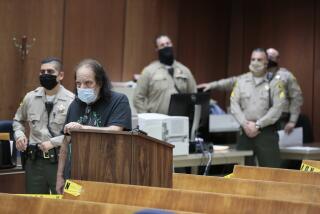Judge Blocks Magistrate’s Release of Accused Molester
- Share via
A U.S. magistrate in Los Angeles ordered an accused child molester released on bail over the protests of a federal prosecutor Thursday, explaining that he did not consider the man a threat to the community because local standards regarding sexual conduct are “practically non-existent.”
The decision of Magistrate John R. Kronenberg was reversed after an immediate government appeal to U.S. District Judge Robert M. Takasugi, who ordered the defendant to remain in federal custody pending a hearing set for today.
Kronenberg’s decision came in the case of John Karl Herriot, 33, a former Boy Scout leader and a teacher in a Roman Catholic school, who was indicted this week on federal charges of transporting two boys into the United States from Mexico for immoral purposes.
Assistant U.S. Atty. Joyce Karlin, noting that Herriot was free on $155,000 bail in connection with state child molesting charges at the time of the alleged federal offenses, had urged that he be held without bail as a potential danger to the community.
“There is a lack of hard evidence . . . that the defendant is a threat to anyone, except perhaps in the sexual field,” Kronenberg responded, ordering Herriot released on a $100,000 appearance bond to be secured by a second trust deed on the Palo Alto home of the defendant’s parents.
“I can’t speak for Palo Alto, but community standards here with regard to sexual conduct are practically non-existent,” Kronenberg commented before ordering Herriot’s release. “I don’t think we have any community standards here.
“As for Palo Alto, there’s a liberal university (Stanford) there,” Kronenberg continued. “Their standards are probably just as low.”
As examples of low community standards in Los Angeles regarding sexual conduct, Kronenberg cited the programming of the Playboy Channel carried by the Dimension Cable Service of Times-Mirror Cable Television and a recent three-part series in The Times on Playboy publisher Hugh Hefner.
He accused the newspaper of “glorifying one of the leading pornographers in the country” in its series on Hefner.
“I think it’s abominable that the local newspaper would run a three-part series on Hefner,” Kronenberg said in a telephone interview later. “I know Bella (Stumbo, author of the series) was probably assigned to do a hatchet job, but it just glorified him. To me he’s nothing but a damn pornographer.”
Kronenberg said he cited The Times and Times-Mirror Cable Television, both divisions of Times-Mirror Co., not just as examples of the low community standards on sex, but as causes of the community’s attitudes.
“You are both,” he said. “You’re an example of what people can get away with.”
Kronenberg, who has been a federal magistrate since 1973, added during the interview that the Playboy Channel is carried by Times-Mirror Cable Television in the Palos Verdes area where he resides, and that he believes that all the children in the area have learned how to “unscramble” the signal even if their parents do not subscribe to the channel.
“They don’t scramble the dialogue at all,” he said. “All this crap comes into your home. Even if the picture is scrambled, you can fine tune it and get a picture. I’m sure that all the neighborhood kids are onto it by now.”
Kronenberg’s logic in citing community standards on sexual behavior as reason for releasing an accused child molester on bail was questioned both by U.S. Atty. Robert C. Bonner and by William F. Thomas, editor of The Times.
“It’s the strangest reasoning I’ve ever heard from a federal magistrate,” Thomas said.
“The magistrate has a dimmer view of moral standards in this community than I do,” Bonner said. “I would hope and I believe that most members of our community have a different view of things.”
Herriot, according to Karlin, taught at Our Lady of Soledad school in East Los Angeles until he was arrested last summer on state charges of molesting five boys. The prosecutor said the two boys in the federal case--ages 9 and 13--were taken from their impoverished Mexican mothers in August after Herriot convinced them he would adopt and educate the children in the United States.
Kronenberg also said in ordering Herriot’s release that the government had failed to provide any “physical evidence” that any molestations occurred.
More to Read
Sign up for Essential California
The most important California stories and recommendations in your inbox every morning.
You may occasionally receive promotional content from the Los Angeles Times.













